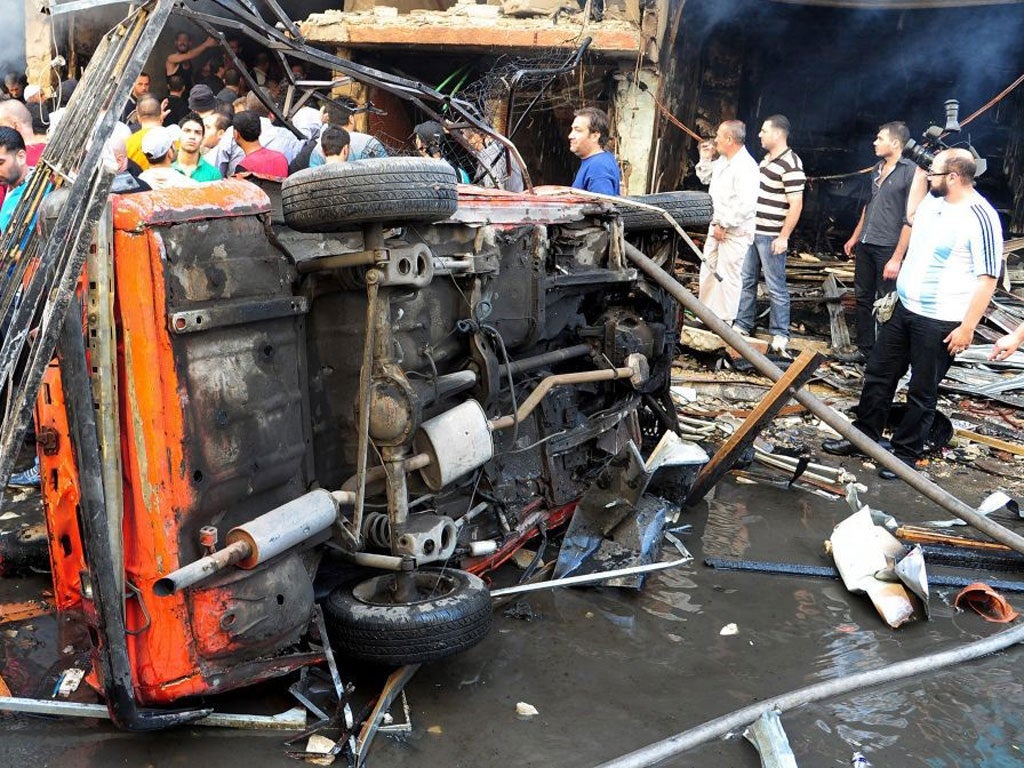Air strikes and car bomb signal bloody end to Syria's failed truce
UN envoy flies to Russia in attempt to resolve worsening violence

President Bashar al-Assad's fighter jets wreaked destruction across Syria on the last day of a supposed ceasefire yesterday, leaving no doubt that the UN-brokered initiative had failed.
Admitting defeat, the UN-Arab League envoy Lakhdar Brahimi lamented that the violence was getting worse as smoke billowed above Damascus and other rebel strongholds following an estimated 60 strikes. Opposition groups claimed it was the most brutal use of firepower yet.
The UN Secretary General, Ban Ki-moon, said he was "deeply disappointed" that the four-day truce for the Eid festival had collapsed.
The violence came a day after the Syrian army claimed that "terrorists" had repeatedly violated the ceasefire and vowed to use an "iron fist" against them. It appeared to fulfil that promise yesterday. The heaviest air strikes were on areas in the northeast of the capital including Harasta, which the army has been trying to seize back from rebel hands.
Adding to the chaos, a car bomb exploded outside a bakery in the Jaramana district, a largely Druze and Christian area in the capital's south-east where residents are said to largely support the regime. The blast, which tore the fronts off several buildings, killed at least six people, according to state media, which ran footage of firefighters dousing the smouldering wreckage.
The announcement of the Eid truce had been met with scepticism and collapsed in many parts of the country almost as soon as it began, with neither side showing commitment to uphold it. With the latest effort to bring a halt to the fighting in tatters, Mr Brahimi was attempting to pick up the pieces yesterday, visiting Russia in an attempt to secure the assistance of one of Assad's most powerful allies in building a comprehensive solution.
Following talks with the Russian foreign minister, Sergei Lavrov, Mr Brahimi said: "The situation is very, very dangerous; the situation is bad and getting worse."
As the international community dithers, the death toll continues to mount. It is estimated that 32,000 people have been killed during the 19 months of violence. Activists claim as many as 400 people died during the first three days of the supposed ceasefire alone, with the Local Co-ordination Committees adding that 68 were killed yesterday, mostly around the capital.
The Syrian Observatory for Human Rights said more than 60 air strikes were carried out yesterday in the heaviest use of airpower during the conflict, although other activists disputed that assessment. Damascus-based Mohammed Saeed said: "We have seen worse days."
Regime aircraft were also said to have hit the strategic town of Murat al Numan in Idlib province. Its earlier capture by rebels severed a key supply line for Assad's troops in Aleppo.
There were gruesome scenes in the Hajar Aswad area of southern Damascus after a minibus was purportedly hit by a regime shell, killing eight people including several children. One video showed a mangled body being pulled from the smoking wreckage. State television gave a conflicting narrative of events, saying the deaths were caused by a car bomb.
Despite the failure of the truce, Mr Brahimi said he would not be discouraged from his mission. "We will continue to work as hard as we possibly can, in co-operation with everybody inside of Syria and outside of Syria, to bring down the level of violence, put an end to it," he said, adding that there were no plans to send in UN peacekeepers.
Analysts said the fact that international efforts were focused on a brief, four-day ceasefire highlighted the lack of any real initiative to end the bloodshed.
"The international community wants to feel like it's doing something," said Salman Shaikh. "But you can't expect a fragmented opposition and the regime – which is increasingly losing control of very important strategic areas – to feel like they can let go at this time. This model doesn't work. We are losing Syria."
Running on empty: the road to peace
Lakhdar Brahimi's effort to bring about a lull in violence over the Eid al-Adha festival is the latest initiative to crumble. Without any mechanism for monitoring or enforcing a truce, it stood little chance of success.
His predecessor Kofi Annan's attempt to forge a ceasefire in April was similarly doomed. Though it started with a brief decline in heavy bombardment, the violence soon ramped up to unprecedented levels, as 300 United Nations observers looked on helplessly.
The ceasefire was one step of Mr Annan's six-point peace plan, which failed to come to fruition. Some analysts say efforts must now focus on building unity in the opposition and forging a vision for a post-Assad Syria, rather than ceasefires and a transition led by Mr Assad.
An Arab League peace plan, which the Syrian regime agreed to in December, ended in controversy as UN monitors were accused of providing cover for the crimes of Assad's forces. The mission was suspended after just over a month.
Subscribe to Independent Premium to bookmark this article
Want to bookmark your favourite articles and stories to read or reference later? Start your Independent Premium subscription today.

Join our commenting forum
Join thought-provoking conversations, follow other Independent readers and see their replies